One man's love and legacy of paper: How A'zone and its lecture pads stood the test of time
"I will be continuing (to do) the same thing, until I'm gone," A'zone Corporation founder Bernie Lee tells CNA.
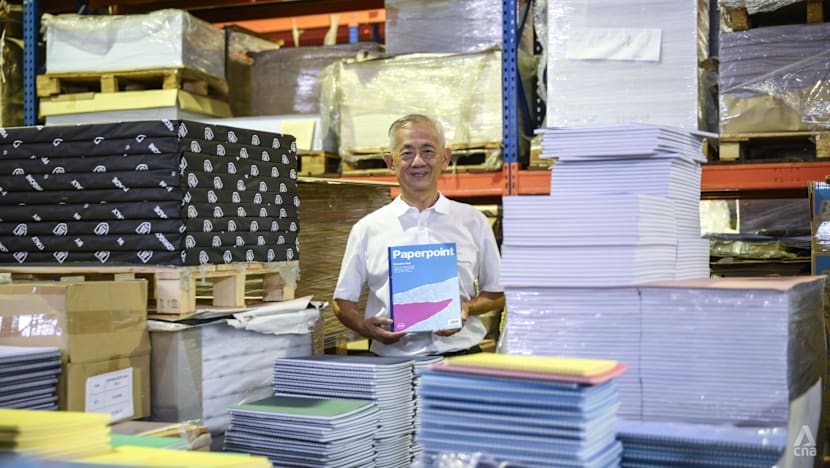
Founded more than three decades ago by Mr Bernie Lee, A’zone Corporation has produced products like the Paperpoint lecture pads, notepads and sketchbooks used by generations of students. (Photo: CNA/Wallace Woon)

This audio is generated by an AI tool.
SINGAPORE: Inside an industrial building east of Singapore, work is in full swing.
A truck carrying paper shipped from Austria has just arrived at the Loyang neighbourhood, and workers move quickly to unload the heavy pallets.
For paper destined to become notepads and lecture pads, the journey begins with the printing process, where lines, checks and grids are embossed at another location.
The sheets are then sent back to the factory to be sorted and counted by a machine. Various objects like inserts and covers are attached, before a trimming machine takes over to cut them into specific sizes.
A few more steps later and the final products, emblazoned with the A'zone logo, will be shipped to distributors all around Singapore as they have been for the past few decades.
Mention A'zone to most Singaporeans, and you're likely to get a knowing nod. To those born in the 1980s and 1990s in particular, the company's various writing and lecture pad designs will evoke memories of school-going, foolscap-tearing days.
But much has changed since, with the world today preferring MacBooks over notebooks or styluses and tablets over pen and paper.
Yet the work continues for A'zone and its founder Bernie Lee. The goal is simple: To keep the homegrown company going for as long as he can.
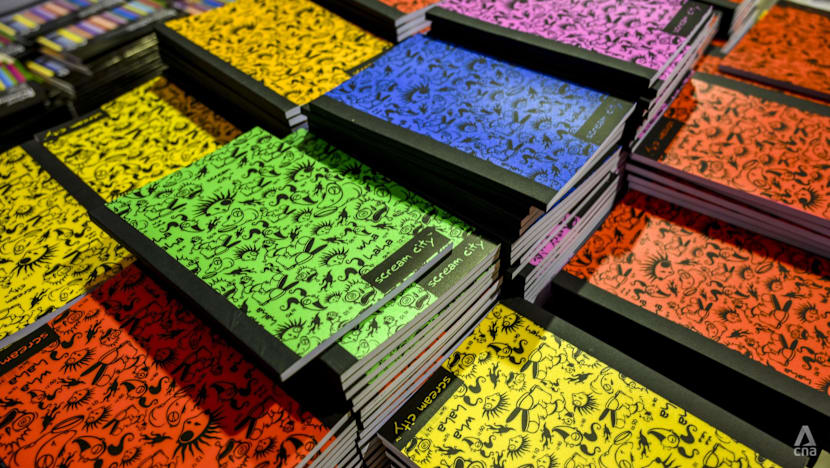
STARTING WITH STATIONERY
Mr Lee's first-ever job was as a printing agent. But he also had an entrepreneurial itch to scratch, and having identified opportunities in what he described as the prosperous business environment of the day, decided to get into something he was truly passionate about - paper and stationery supplies.
"During our young days, most of us teenagers were fascinated by all the fanciful stationery at the Japanese (department) stores such as Yaohan and Daimaru," the 69-year-old told CNA. "We'd buy paper, stationery without knowing what we want to use it for. That's where I (thought), I better start producing my own stationery."
In 1979, Mr Lee partnered with a relative to open a shop called Dawn-Bernie Office Supplies at the old Plaza Hotel.
"Everything worked well. Businesses (were) expanding, a lot of foreign companies (were) coming to Singapore, and we did a pretty good job," he recalled.
"After that, we realised that it's just trading ... (I would) buy and sell, which doesn't have very good potential in a growing market. Then I decided to go into the next step which was manufacturing and distribution."
Mr Lee purchased raw materials locally and started producing paper products out of a shop unit provided by a partner.
"I (was) always curious about paper, and love paper," he said.
His first product was Besform, a business form for small companies to use. The brand name came about from "the best of all forms", said Mr Lee.
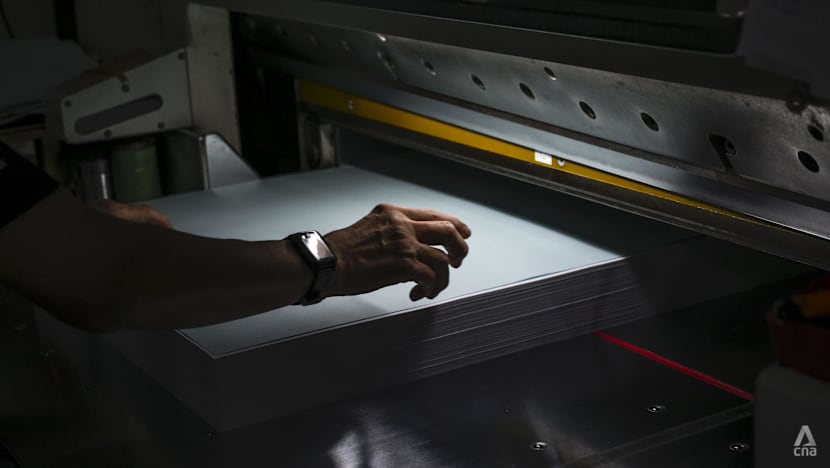
Next, he wanted to create a product to appeal to the younger generation. The Paperpoint lecture pad was born - in this case, it was an amalgamation of "the final point is paper".
"When the kids carried this to school, they felt proud," said Mr Lee.
And in 1989, when he finally incorporated his business into a private limited, he similarly had a reason for choosing "A'zone": "From A to Z, we want to be the top, number one brand."
Mr Lee's next creation was the Save the Planet lecture pad, originally made from recycled paper and a response to how "people were concerned with messages" at the time.
"Save the planet, save the earth, save the trees," he recalled.
Another popular lecture pad was Scream City. "In the 90s, this was a period when the young were ... rebellious; they felt they had to be outspoken," said Mr Lee, when asked what inspired the design.
"It was a very crazy world ... It was a messy world so they 'screamed' it out."
A SUNSET INDUSTRY?
Beyond memorable designs and titles, A'zone's driving ethos has always been to be "useful to the user", said Mr Lee.
He recalled how someone once asked him what it was about his products that stood out, given the "thousands" of businesses printing paper products.
"He opened my mind ... That is why whatever I do, I focus on consumer, consumer, consumer."
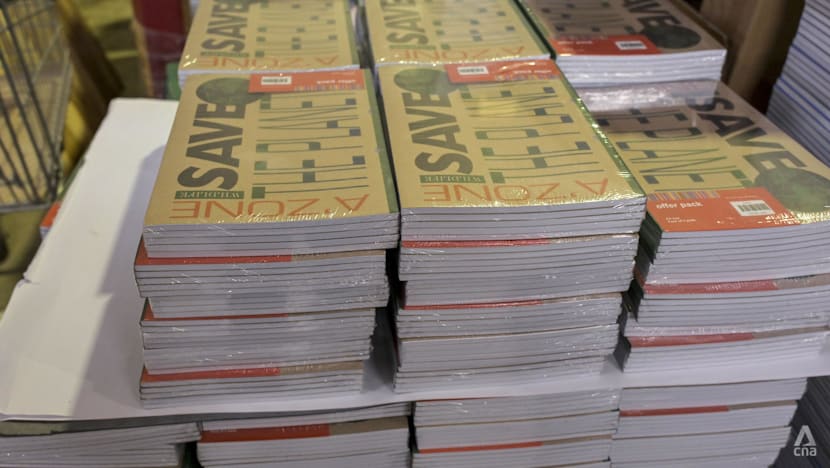
For Besform, this meant producing in larger sizes so companies could fill in more details, and using No Carbon Required (NCR) paper to eliminate the need for an additional sheet of carbon paper.
When it came to Paperpoint, it was to have the writing pad flip open from the side rather than the top, unlike most similar products in the day.
The Paperpoint and Save the Planet lecture pads remain bestsellers today, said Mr Lee, though he declined to provide sales figures.
He noted how several local competitors have come and gone over the years, though A'zone is not the only survivor with firms like U-Grade and Overseas Associates Private Limited continuing to produce paper products.
Mr Lee's company has also faced challenges in manpower and office space. It hasn't been easy to find new production workers, with many A'zone employees remaining with the company for years. Meanwhile rental costs in Singapore have gone up.
It is technology, however, which threatens to be the biggest trial of all; and the uncertainty over his firm's place in the future is what keeps Mr Lee up at night.
"It's a sunset (industry) due to the modern lifestyle and technological advancements," he said. "(People are) using less paper or no paper at all."
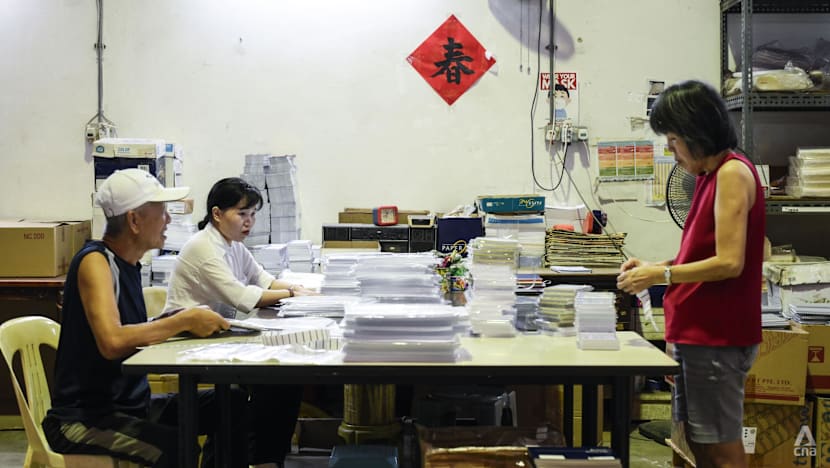
In response, A'zone's strategy has been to focus more on producing quality art and craft products.
"We observed that the current generation of parents are very concerned with their children's welfare. Since technology helped them in their knowledge and intelligence, they need to upgrade their skills and that's where arts and crafts come in," said Mr Lee.
"Arts and crafts mean that you have to use certain talents - either your hands or your brains ... Instead of selling plain paper or writing paper which your kids won't be using, we think of what type of paper suits your artwork."
Paired with this is increased attention to how these products are packaged, branded, designed and marketed.
One example is A'zone's Monjojo line of watercolour pads, drawing blocks and sketchbooks; which was started post-pandemic.
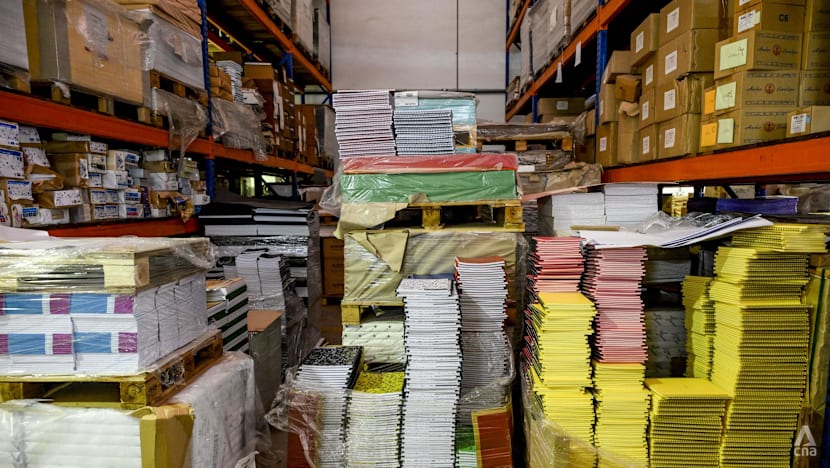
LOOKING TO THE FUTURE
Currently, A'zone still manufactures about 70 per cent of its products in Singapore, with about 20 per cent done across the Causeway. Mr Lee wants to eventually outsource even more of his production process to abroad.
He said the firm's main market will continue to be Singapore, even as it exports to Malaysia and Brunei.
Building anything like an international paper empire has never been the goal.
"I personally don't believe in spending your whole life looking for more business. I'd rather take care of my company, my staff and my family," he said.
What makes Mr Lee proud is to have people who used A'zone in their childhood come up and tell him that they now buy these products for their kids.
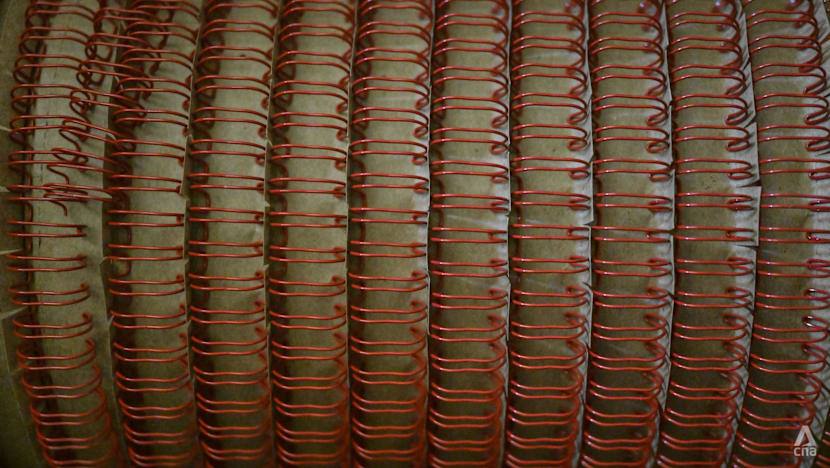
His own son Lee Jielong, 40, is a believer in paper products retaining their market niche, even if demand drops and tech takes over completely.
"I still feel that for education, it's a very important tool," he told CNA. "You still have to write on paper to get a feel; and paper has that personal touch ... To practise drawing, you still have to learn the strokes, how the hard the brush feels, and all that."
The plan is for the younger Mr Lee, who is also a director at A'zone, to take over someday, said his father.
"In this business, it's like musical chairs: The weaker one will lose out on the seat. And we just hope that we are the last one in this game in Singapore," said the elder Lee.
To that end, he fully intends to keep fighting the good fight and staying involved with the firm – in particular conceptualising and creating new products, just as he did in the beginning.
"I will be continuing (to do) the same thing," said Mr Lee. "Until I'm gone."














